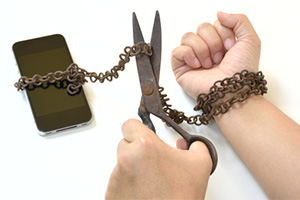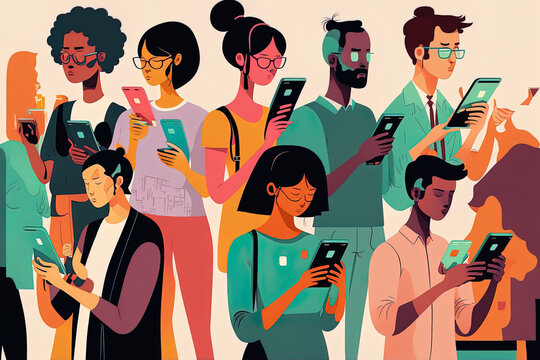Why is it impossible to leave our Phones?
Social media has become an integral part of our daily lives, offering connectivity and a window to the world. However, its addictive nature can often lead to detrimental effects on our well-being and relationships. Understanding the underlying factors contributing to social media addiction is crucial in addressing this issue.
Social Media: The Addict
Social media platforms are designed to trigger a release of dopamine, the pleasure hormone, upon receiving likes, comments, or notifications.

This dopamine rush can create a sense of pleasure similar to that experienced with substance abuse, leading to addictive behaviors.
Moreover, features like infinite scrolling, constant renewal of content, and consistent notifications keep users engaged, further exacerbating the phone’s overuse.
Recognizing the Negative Effects
While social media offers various benefits, including connectivity and information dissemination, its overuse can have detrimental effects on mental and physical health.
From heightened anxiety and depression to cognitive impairment and reduced social interactions, the negative consequences of social media overuse are manifold.
Tips for Preventing Social Media Addiction
Delegate Social Media to a Separate Device
 Designate a specific device for accessing social media to prevent constant distractions and notifications. By limiting access to social media platforms, you can regain control over your usage and minimize addictive behaviors.
Designate a specific device for accessing social media to prevent constant distractions and notifications. By limiting access to social media platforms, you can regain control over your usage and minimize addictive behaviors.
Consider the Real Benefits
Reflect on the actual benefits derived from using social media and weigh them against the negative impacts. Being aware of the tactics employed by social media companies to keep users engaged can help you make informed decisions about your usage.
Know When to Tune In
Be mindful of your social media usage and avoid using it as a means to procrastinate or escape from responsibilities. Set specific times for checking social media and prioritize real-life interactions and activities. Practice digital fasting to detatch from the manacles of social media
Freeze Your Applications
 Utilize features available on mobile devices to temporarily freeze or limit access to social media apps. This can provide much-needed breaks from constant notifications and help redirect your focus to more meaningful pursuits.
Utilize features available on mobile devices to temporarily freeze or limit access to social media apps. This can provide much-needed breaks from constant notifications and help redirect your focus to more meaningful pursuits.
Practice Self-Control
Set limits on the amount of time spent on social media and monitor your behavior when using these platforms. Practicing self-control can help curb addictive tendencies and promote healthier usage habits.
Spend More Time Offline
Engage in activities and outings that do not involve social media, such as spending time with friends and family or pursuing hobbies. Prioritizing offline interactions can foster deeper connections and reduce reliance on social media for validation and entertainment.
Turn off Notifications
Disable notifications for social media apps to minimize distractions and reduce the urge to constantly check for updates. Setting specific times during the day to check social media can help break the cycle of compulsive usage.
Seek Help
If you or a loved one is struggling with social media addiction, seeking professional help may be necessary. Therapists experienced in addressing compulsive behaviors and process addictions can provide valuable support and guidance in overcoming craving.
Final Thoughts
 Social media dependency poses significant challenges to our physical and mental well-being.
Social media dependency poses significant challenges to our physical and mental well-being.
By implementing the tips and strategies outlined above, individuals can take proactive steps to prevent addiction and foster healthier relationships with social media.
However, seeking specialized help may be necessary for those struggling to break free from the grip of addiction. Therapists help individuals overcome social media addiction and reclaim control over their lives.











